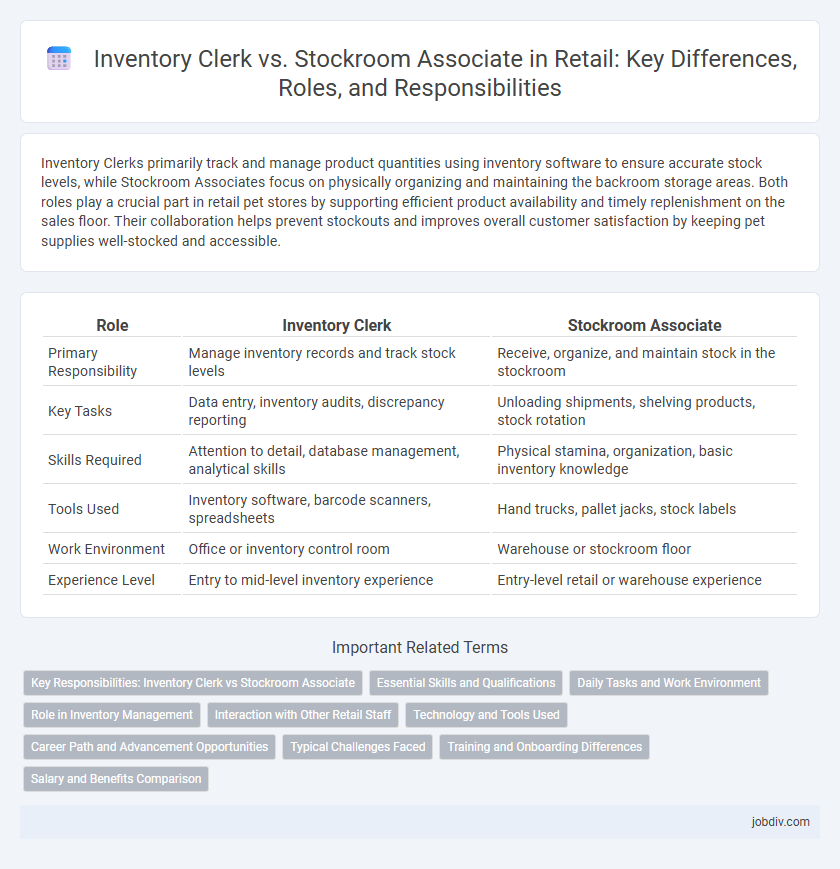Inventory Clerks primarily track and manage product quantities using inventory software to ensure accurate stock levels, while Stockroom Associates focus on physically organizing and maintaining the backroom storage areas. Both roles play a crucial part in retail pet stores by supporting efficient product availability and timely replenishment on the sales floor. Their collaboration helps prevent stockouts and improves overall customer satisfaction by keeping pet supplies well-stocked and accessible.
Table of Comparison
| Role | Inventory Clerk | Stockroom Associate |
|---|---|---|
| Primary Responsibility | Manage inventory records and track stock levels | Receive, organize, and maintain stock in the stockroom |
| Key Tasks | Data entry, inventory audits, discrepancy reporting | Unloading shipments, shelving products, stock rotation |
| Skills Required | Attention to detail, database management, analytical skills | Physical stamina, organization, basic inventory knowledge |
| Tools Used | Inventory software, barcode scanners, spreadsheets | Hand trucks, pallet jacks, stock labels |
| Work Environment | Office or inventory control room | Warehouse or stockroom floor |
| Experience Level | Entry to mid-level inventory experience | Entry-level retail or warehouse experience |
Key Responsibilities: Inventory Clerk vs Stockroom Associate
Inventory Clerks manage accurate record-keeping of stock levels, perform regular inventory audits, and ensure data entry aligns with retail management systems to prevent discrepancies. Stockroom Associates handle receiving shipments, organizing stock efficiently, and replenishing sales floors to maintain product availability and orderliness. Both roles are essential for seamless inventory control and operational efficiency in retail environments.
Essential Skills and Qualifications
Inventory Clerks excel in data accuracy, proficiency with inventory management software, and strong organizational skills essential for tracking stock levels and maintaining precise records. Stockroom Associates demonstrate expertise in physical stock handling, spatial organization, and teamwork to efficiently receive, store, and distribute merchandise within retail environments. Both roles require attention to detail, basic math skills, and the ability to operate equipment safely to support seamless inventory flow.
Daily Tasks and Work Environment
Inventory Clerks focus on accurately tracking stock levels using inventory management software, performing cycle counts, and updating database records to ensure accurate product availability. Stockroom Associates primarily handle physical tasks such as receiving deliveries, organizing stockroom shelves, and preparing items for sales floor restocking in fast-paced retail environments. Both roles require attention to detail and efficiency, but Inventory Clerks operate more with data management, while Stockroom Associates engage in manual labor within the back-of-store warehouse space.
Role in Inventory Management
An Inventory Clerk primarily manages accurate record-keeping, tracking inventory levels, and updating databases to ensure stock accuracy. A Stockroom Associate focuses on physically handling goods, organizing stock, and replenishing shelves to maintain efficient inventory flow. Both roles collaborate to optimize inventory management, reducing discrepancies and improving overall retail operations.
Interaction with Other Retail Staff
Inventory clerks collaborate closely with purchasing managers and sales teams to ensure accurate stock levels and timely replenishment. Stockroom associates primarily interact with floor staff and cashiers, facilitating efficient product transfers and organizing stock for quick retrieval. Both roles require effective communication with retail staff to maintain seamless inventory flow and support overall store operations.
Technology and Tools Used
Inventory Clerks utilize inventory management software such as RFID scanners and barcode systems to track stock levels and update databases in real time. Stockroom Associates rely more on handheld devices, pallet jacks, and mobile apps designed for stock placement and order fulfillment within storage areas. Both roles increasingly leverage cloud-based platforms for seamless communication and efficient inventory control across retail operations.
Career Path and Advancement Opportunities
Inventory Clerks typically advance by specializing in inventory management software and analytics, leading to roles such as Inventory Supervisor or Supply Chain Analyst. Stockroom Associates often progress by gaining expertise in warehouse operations and logistics, which can open pathways to positions like Warehouse Manager or Logistics Coordinator. Both roles offer distinct career trajectories, with Inventory Clerks focusing on data accuracy and inventory control, while Stockroom Associates emphasize physical stock handling and operational efficiency.
Typical Challenges Faced
Inventory clerks frequently encounter challenges such as maintaining accurate stock records amid high product turnover and mitigating discrepancies caused by labeling errors or delayed updates. Stockroom associates often face difficulties managing space constraints and ensuring the timely retrieval of goods, which impacts overall warehouse efficiency. Both roles must adapt to fluctuating inventory volumes and implement streamlined processes to reduce errors and stockouts.
Training and Onboarding Differences
Inventory Clerks undergo specialized training in inventory management systems, barcode scanning, and data accuracy to ensure precise stock records. Stockroom Associates receive hands-on onboarding focused on physical stock handling, organization, and replenishment protocols to maintain efficient warehouse operations. Training for Inventory Clerks emphasizes software proficiency and audit compliance, while Stockroom Associates prioritize operational workflow and safety procedures.
Salary and Benefits Comparison
Inventory Clerks earn an average salary of $32,000 to $38,000 annually, reflecting their role in managing and tracking stock levels, while Stockroom Associates typically make between $28,000 and $34,000. Benefits for Inventory Clerks often include healthcare, paid time off, and occasional bonuses due to their administrative responsibilities, whereas Stockroom Associates usually receive standard benefits such as health insurance and employee discounts. Salary growth potential tends to be higher for Inventory Clerks because of their specialized inventory management skills and closer involvement with inventory systems.
Inventory Clerk vs Stockroom Associate Infographic

 jobdiv.com
jobdiv.com